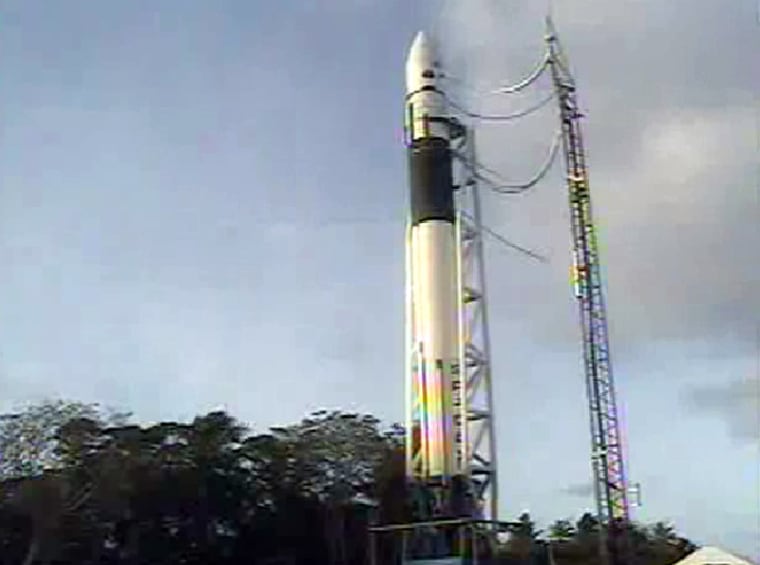For the fourth time in almost four months, Space Exploration Technologies readied a rocket on its launch pad Friday for the company's first-ever satellite launch — the culmination of a four-year, $100 million effort.
The mission to loft an Air Force research satellite into orbit would mark the debut of SpaceX's two-stage, partially reusable Falcon 1 rocket, which the company says is the world's first all-new orbital launch vehicle in more than a decade. Success could dramatically change the cost equation for putting payloads into space, because the Falcon's $6.7 million price tag is far cheaper than the current industry standard.
However, the path to the maiden flight has not been totally smooth: Three times before, preparations at SpaceX's Pacific launch pad on Omelek Island in Kwajalein Atoll have been aborted, due to equipment glitches or unacceptable weather.
SpaceX's millionaire founder and chief executive officer, Elon Musk, has repeatedly said such delays are not unusual in the development of a brand-new rocket. "Our approach has been to take no chances whatsoever," he told MSNBC.com during the buildup to this latest launch attempt.
The first countdown, last November, was called off with just minutes to go due to a computer glitch and a stuck liquid-oxygen valve. The second attempt went awry in December when a fuel tank was dented due to a faulty depressurization valve. The third time, computer glitches encountered during a test countdown forced a delay.
Over the past week, SpaceX conducted two more test countdowns at the Kwajalein pad, to wring out the final bugs in the system. During Tuesday's test, the Falcon's rocket engine was fired for almost three seconds while being held down on the pad. "All systems were green and no aborts were triggered," Musk reported.
Friday's launch window lasts from 4 p.m. to 10 p.m. ET, and SpaceX has set up a showing the preparations. Gwynne Shotwell, the company's vice president for business development, said 4,500 users were watching the Webcast at one point.
Falcon 1 is to put the U.S. Air Force Academy's FalconSat 2 satellite into orbit to study space plasma phenomena that may affect the Global Positioning System and other satellite communication networks. The $6.7 million cost of the launch is being covered by the Pentagon's Defense Advanced Research Projects Agency, and the program cost for the 12.5-inch-wide (32-centimeter-wide) satellite is $750,000.
The flight plan calls for Falcon 1's first stage to power the rocket to an altitude of 266,000 feet (81 kilometers). At that point, the first stage would separate, unfurl a parachute and fall back into the Pacific for recovery. Meanwhile, the second stage would put FalconSat2 into its 280-mile (450-kilometer) orbit.
Backup plans madeBecause this maiden launch is essentially a test mission and not dependent on a time schedule, SpaceX's countdown could be held or called off again at any time.
During Friday's countdown, the ship that has the task of retrieving the Falcon 1's first stage was positioned in a restricted area of the rocket range, forcing an unplanned hold, Shotwell said. The ship was told to move, and the countdown resumed at T-minus-75 minutes at 4:15 p.m. ET. That meant launch could take place no earlier than 5:30 p.m. ET.
In case the Falcon 1 doesn't get off the ground on Friday, SpaceX has backup dates reserved through Monday at the island launch complex, which is also used by the U.S. military for tests of the Pentagon's national missile defense system.
Although the military is paying for this initial mission, SpaceX's first launch carries huge implications for NASA and the commercial launch industry as well, said NBC News space analyst James Oberg. "This is a significant private space transportation event, especially in light of NASA's push for commercial cargo and crew delivery to the space station in the future," Oberg wrote in an e-mail.
Bigger plans
SpaceX already has announced plans to develop more powerful versions of its Falcon rocket, as well as a capsule that could be used to deliver cargo or crew members to the international space station. The California-based company is among more than 20 firms that have put in proposals for servicing the orbital station.
If this first launch succeeds, SpaceX would proceed with a second Falcon 1 launch several months later to put the Pentagon's TacSat 1 communications satellite into orbit. There would also be a more unusual secondary payload, arranged through Texas-based Space Services Inc.: memorial capsules containing the cremated remains of 187 people, including Mercury astronaut Gordon Cooper and "Star Trek" actor James Doohan.
Musk founded SpaceX in 2002, as a way to further his "Star Trek"-style vision of establishing a permanent human presence in space. The 34-year-old South African native made his fortune in the dot-com world by co-founding the PayPal electronic payment system, then selling it to eBay for $1.5 billion in 2002.
Musk says he has invested about $100 million of his own money in SpaceX. The company says it already has a "strong manifest" with nine launch contracts through 2010, representing nearly $200 million in revenue.
